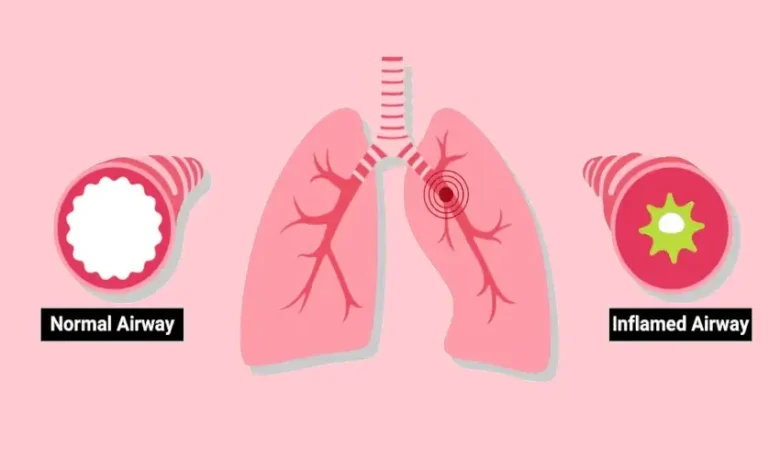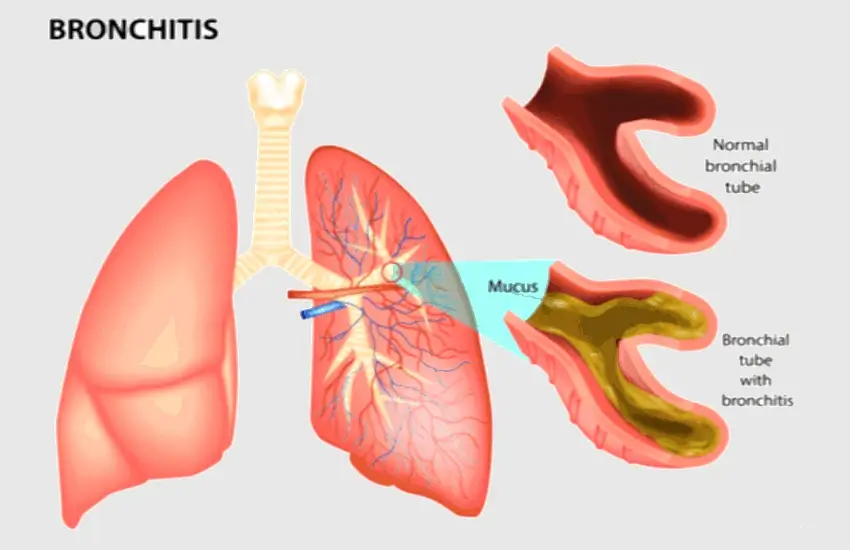Is Bronchitis Contagious? Learn About Its Transmissibility

Is Bronchitis Contagious? Learn About Its Transmissibility. Bronchitis is a common respiratory condition, but one of the most frequent questions is whether it’s contagious. Let’s dive into the details to clear up the confusion and help you stay informed.
What Is Bronchitis?
Definition of Bronchitis
Bronchitis occurs when the bronchial tubes, which carry air to your lungs, become inflamed. This inflammation leads to coughing, mucus production, and other respiratory symptoms.
Acute vs. Chronic Bronchitis
Bronchitis can be classified into two types:
- Acute Bronchitis: Often short-term and triggered by infections.
- Chronic Bronchitis: A long-term condition typically caused by smoking or prolonged exposure to irritants.
Causes of Bronchitis
Viral Infections
Most cases of acute bronchitis are caused by viruses, like the flu or common cold. These can spread easily through droplets in the air.
Bacterial Infections
Though less common, bacteria can also cause bronchitis. These cases might require antibiotics for treatment.
Environmental Factors
Pollutants, allergens, and smoking can irritate the bronchial tubes, contributing to chronic bronchitis.
How Bronchitis Spreads?
Airborne Transmission
Coughing and sneezing release tiny droplets containing the virus into the air, making it easy for others to inhale and get infected.
Direct Contact
Touching contaminated surfaces and then your face can lead to infection. Think of it like shaking hands with someone who just coughed into their palm.

Role of Immunity
A strong immune system can fight off many infections, reducing your risk of catching bronchitis.
Contagious vs. Non-Contagious Bronchitis
Acute Bronchitis
This form is often contagious because it’s usually caused by a virus. Sharing drinks, being nearby, or neglecting hygiene can increase transmission.
Chronic Bronchitis
Chronic bronchitis is not contagious as it stems from environmental factors or lifestyle choices, rather than infections.
Signs and Symptoms of Bronchitis
Common Symptoms
- Persistent cough
- Production of mucus (clear, yellow, or green)
- Shortness of breath
- Chest discomfort
Differences in Acute and Chronic Cases
Acute cases are temporary and might include fever, while chronic cases often involve long-term symptoms without fever.
Risk Factors for Bronchitis
Smoking
Smoking irritates the lungs, making it a major risk factor for chronic bronchitis.
Exposure to Irritants
Chemicals, dust, and pollutants can trigger bronchitis in people exposed over time.
Weakened Immune System
Age, stress, and health conditions can weaken your immunity, increasing the risk.
Preventing the Spread of Bronchitis
Hygiene Practices
Wash your hands frequently and use hand sanitizers to avoid infections.
Avoiding Close Contact
Stay away from infected individuals, especially during the contagious phase.
Vaccination
Flu shots and other vaccines can help reduce the risk of respiratory infections.
Diagnosing Bronchitis
Medical History
Doctors will ask about your symptoms, duration, and any exposure to irritants.
Tests and Scans
In some cases, chest X-rays or sputum tests are needed to confirm the diagnosis.

Treating Bronchitis
Home Remedies
- Stay hydrated
- Use a humidifier
- Rest and avoid overexertion
Medical Treatments
Doctors might recommend inhalers, cough suppressants, or antibiotics (if bacterial).
When to See a Doctor?
If your symptoms persist beyond three weeks, or you have a high fever or difficulty breathing, seek medical attention.
Debunking Myths About Bronchitis
Many people think all bronchitis is contagious, but chronic bronchitis is not. Understanding the difference is crucial.
Bronchitis in Children and the Elderly
Special Considerations for Kids
Children are more prone to acute bronchitis due to weaker immunity. Keep them away from sick individuals and ensure proper hygiene.
Search for Health: Facial Temperature and Mayo Clinic Larynx Transplant.
Managing Bronchitis in Seniors
Elderly individuals should avoid crowded places and get vaccinated to lower their risk.
How Long Is Bronchitis Contagious?
Acute bronchitis can be contagious for up to two weeks, depending on the cause. Avoid contact with others until symptoms improve.
Recovery and Outlook
Most people recover from bronchitis within a few weeks, especially with proper rest and care. Chronic bronchitis, however, requires ongoing management.
Conclusion
Bronchitis can be contagious or non-contagious depending on its type. Knowing the difference helps in managing and preventing its spread. Take precautions, seek timely treatment, and prioritize your health.
FAQs
1. Is bronchitis contagious to everyone?
Not everyone exposed will get bronchitis. It depends on immunity and overall health.
2. Can you catch bronchitis twice?
Yes, especially if exposed to new infections or triggers.
3. How do you know if bronchitis is viral or bacterial?
Doctors can determine the cause through tests and symptoms.
4. Can chronic bronchitis become contagious?
No, chronic bronchitis itself isn’t contagious.
5. What is the fastest way to recover from bronchitis?
Rest, hydration, and avoiding irritants are key to recovery.







